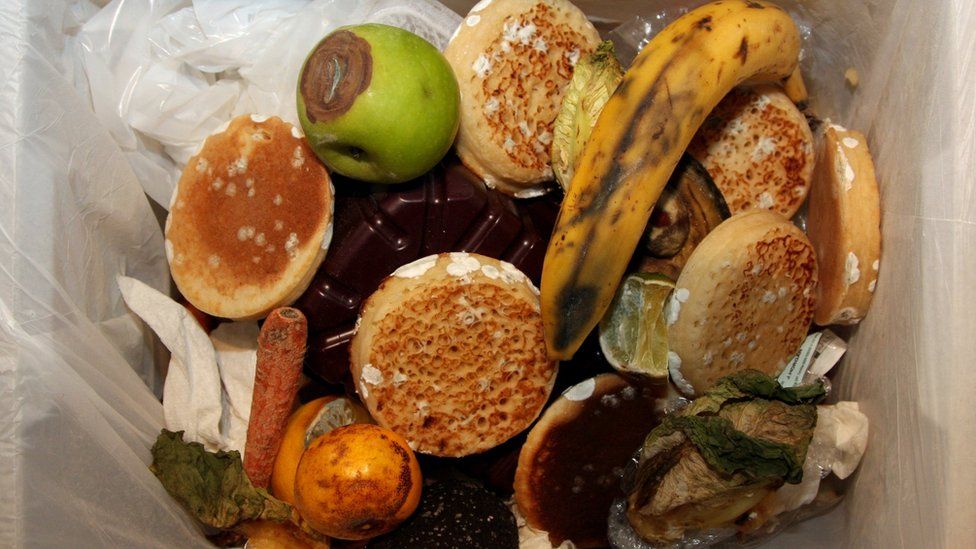Cutting food and carbon waste-lines for healthy climate
- Published

Reducing food waste and changing the way people consume calories will help deliver a sustainable food system and reduce emissions, a study suggests.
The global demand for food could more than double by the middle of the century, yet an estimated one third of produce is lost or wasted each year.
By cutting this waste will help food security and reducing agriculture's climate burden, the researchers added.
The findings appear in the journal Environmental Science & Technology.
As the global human population is set to reach in excess of nine billion people by the middle of this century, up from the current seven billion, the importance of reducing food loss and waste in order to deliver food security is well documented.
However, a team of scientists have also considered what steps need to be taken to tackle food production's contribution to global carbon emissions.
Prof Jurgen Kropp from the Potsdam Institute for Climate Impact Research, Germany, one of the study's co-authors said that previous studies had highlighted that "agriculture was playing an increasingly important role when it came to carbon dioxide emissions".
"We have worldwide lifestyle changes where people are moving towards a meat-rich diet and we need more food, of course," he told BBC News.
"The more rich a country becomes, there is a move towards more meat-rich diets and, of course, more calorie-rich diets.
"For one calorie of meat, you have to utilise one to eight calories of cereal. It is an inefficient form of food production," he observed.
"On the other hand, rich countries are wasting more food. A lot of the food we are producing at the moment, we do not see on our plates."
Prof Kropp added that this trend was projected to have a considerable impact on the global carbon budget by the middle of the 21st Century.
They calculated that about 10% of global greenhouse gas emissions from agriculture could be traced back to food waste by 2050.
However, the team examined past datasets and used future scenarios to identify pathways that could deliver improvements in food security and CO2 emissions.
The team observed: "The global food requirement changed from 2,300 [calories per person each day] to 2,400 [calories per person each day] during the past 50 years, while the food surplus grew from 310 [calories per person each day] to 510 [calories per person each day]."
Over the same period, the team found that greenhouse gas emissions associated with food surplus increased from 130 million tones of CO2 equivalent per year to 530 million tonnes - an increase of more than 300%.
Future scenarios did not make comfortable reading. They calculated that emissions associated with the food wasted may "increase tremendously" to up to 2.5 giga-tonnes of CO2 equivalent per year.
Prof Kropp added: "As many emerging economies like China or India are projected to rapidly increase their food waste as a consequence of changing lifestyle, increasing welfare and dietary habits towards a larger share of animal-based products, this could over proportionally increase greenhouse-gas emissions associated with food waste [while] undermining efforts for an ambitious climate protection.
"Avoiding food loss could pose a leverage to various challenges at once, reducing environmental impacts of agriculture, saving resources used in food production, and enhance local, regional, and global food security."
Follow Mark on Twitter
Related Topics
- Published24 November 2015
- Published3 July 2014
- Published28 October 2015
- Published1 September 2014